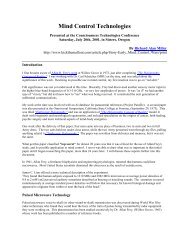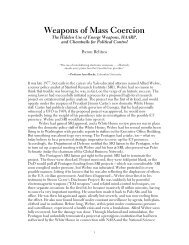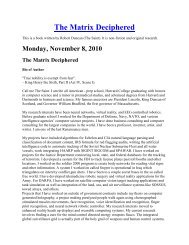Mind Games - Freedom From Covert Harassment and Surveillance
Mind Games - Freedom From Covert Harassment and Surveillance
Mind Games - Freedom From Covert Harassment and Surveillance
You also want an ePaper? Increase the reach of your titles
YUMPU automatically turns print PDFs into web optimized ePapers that Google loves.
impending doom, or encourage the enemy to surrender," the author concluded.In 2002, the Air Force Research Laboratory patented precisely such a technology: usingmicrowaves to send words into someone's head. That work is frequently cited on mind-controlWeb sites. Rich Garcia, a spokesman for the research laboratory's directed energydirectorate, declined to discuss that patent or current or related research in the field, citing thelab's policy not to comment on its microwave work.In response to a <strong>Freedom</strong> of Information Act request filed for this article, the Air Forcereleased unclassified documents surrounding that 2002 patent -- records that note that thepatent was based on human experimentation in October 1994 at the Air Force lab, wherescientists were able to transmit phrases into the heads of human subjects, albeit withmarginal intelligibility. Research appeared to continue at least through 2002. Where this workhas gone since is unclear -- the research laboratory, citing classification, refused to discuss itor release other materials.The official U.S. Air Force position is that there are no non-thermal effects of microwaves. YetDennis Bushnell, chief scientist at NASA's Langley Research Center, tagged microwaveattacks against the human brain as part of future warfare in a 2001 presentation to theNational Defense Industrial Association about "Future Strategic Issues.""That work is exceedingly sensitive" <strong>and</strong> unlikely to be reported in any unclassifieddocuments, he says.Meanwhile, the military's use of weapons that employ electromagnetic radiation to create painis well-known, as are some of the limitations of such weapons. In 2001, the Pentagondeclassified one element of this research: the Active Denial System, a weapon that useselectromagnetic radiation to heat skin <strong>and</strong> create an intense burning sensation. So, yes, thereis technology designed to beam painful invisible rays at humans, but the weapon seems to fallfar short of what could account for many of the TIs' symptoms. While its exact range isclassified, Doug Beason, an expert in directed-energy weapons, puts it at about 700 meters,<strong>and</strong> the beam cannot penetrate a number of materials, such as aluminum. Considering thesize of the full-scale weapon, which resembles a satellite dish, <strong>and</strong> its operational limitations,the ability of the government or anyone else to shoot beams at hundreds of people -- on citystreets, into their homes <strong>and</strong> while they travel in cars <strong>and</strong> planes -- is beyond improbable.But, given the history of America's cl<strong>and</strong>estine research, it's reasonable to assume that if thedefense establishment could develop mind-control or long-distance ray weapons, it almostcertainly would. And, once developed, the possibility that they might be tested on innocentcivilians could not be categorically dismissed.Girard, for his part, believes these weapons were not only developed but were also tested onhim more than 20 years ago.What would the government gain by torturing him? Again, Girard found what he believed tobe an explanation, or at least a precedent: During the Cold War, the government conductedradiation experiments on scores of unwitting victims, essentially using them as human guineapigs. Girard came to believe that he, too, was a walking experiment.Not that Girard thinks his selection was totally r<strong>and</strong>om: He believes he was targeted becauseof a disparaging remark he made to a Republican fundraiser about George H.W. Bush in theearly 1980s. Later, Girard says, the voices confirmed his suspicion."One night I was going to bed; the usual drivel was going on," he says. "The constant streamof drivel. I was just about to go to bed, <strong>and</strong> a voice says: 'Mr. Girard, do you know who was inour studio with us? That was George Bush, vice president of the United States.'"GIRARD'S STORY, HOWEVER STRANGE, reflects what TIs around the world report: achance encounter with a government agency or official, followed by surveillance <strong>and</strong> gang
stalking, <strong>and</strong> then, in many cases, voices, <strong>and</strong> pain similar to electric shocks. Some in thecommunity have taken it upon themselves to document as many cases as possible. One TIfrom California conducted about 50 interviews, narrowing the symptoms down to severalmajor areas: "ringing in the ears," "manipulation of body parts," "hearing voices," "piercingsensation on skin," "sinus problems" <strong>and</strong> "sexual attacks." In fact, the TI continued, "manyreport the sensation of having their genitalia manipulated."Both male <strong>and</strong> female TIs report a variety of "attacks" to their sexual organs. "My testiclesbecame so sore I could barely walk," Girard says of his early experiences. Others, however,report the attacks in the form of sexual stimulation, including one TI who claims he droppedout of the seminary after constant sexual stimulation by directed-energy weapons. SusanSayler, a TI in San Diego, says many women among the TIs suffer from attacks to theirsexual organs but are often embarrassed to talk about it with outsiders."It's sporadic, you just never know when it will happen," she says. "A lot of the women say it'sas soon as you lay down in bed -- that's when you would get hit the worst. It happened to meas I was driving, at odd times."What made her think it was an electronic attack <strong>and</strong> not just in her head? "There was nosexual attraction to a man when it would happen. That's what was wrong. It did not feel like amuscle spasm or whatever," she says. "It's so . . . electronic."Gloria Naylor, a renowned African American writer, seems to defy many of the stereotypes ofsomeone who believes in mind control. A winner of the National Book Award, Naylor is bestknown for her acclaimed novel, The Women of Brewster Place, which described a group ofwomen living in a poor urban neighborhood <strong>and</strong> was later made into a miniseries by OprahWinfrey.But in 2005, she published a lesser-known work, 1996, a semi-autobiographical bookdescribing her experience as a TI. "I didn't want to tell this story. It's going to take courage.Perhaps more courage than I possess, but they've left me no alternatives," Naylor writes atthe beginning of her book. "I am in a battle for my mind. If I stop now, they'll have won, <strong>and</strong> Iwill lose myself." The book is coherent, if hard to believe. It's also marked by disturbingpassages describing how Jewish American agents were responsible for Naylor's surveillance."Of the many cars that kept coming <strong>and</strong> going down my road, most were driven by Jews," shewrites in the book. When asked about that passage in a recent interview, she defended herlogic: Being from New York, she claimed, she can recognize Jews.Naylor lives on a quiet street in Brooklyn in a majestic brownstone with an interior featuringintricate woodwork <strong>and</strong> tasteful decorations that attest to a successful literary career. Shespeaks about her situation calmly, occasionally laughing at her own predicament <strong>and</strong> herstruggle with what she originally thought was mental illness. "I would observe myself," sheexplains. "I would lie in bed while the conversations were going on, <strong>and</strong> I'd ask: Maybe it isschizophrenia?"Like Girard, Naylor describes what she calls "street theater" -- incidents that might bedismissed by others as coincidental, but which Naylor believes were set up. She noticedsuspicious cars driving by her isolated vacation home. On an airplane, fellow passengersmimicked her every movement -- like mimes on a street.Voices similar to those in Girard's case followed -- taunting voices cursing her, telling her shewas stupid, that she couldn't write. Expletive-laced language filled her head. Naylor soughthelp from a psychiatrist <strong>and</strong> received a prescription for an antipsychotic drug. But themedication failed to stop the voices, she says, which only added to her conviction that theharassment was real.For almost four years, Naylor says, the voices prevented her from writing. In 2000, she says,around the time she discovered the mind-control forums, the voices stopped <strong>and</strong> the
surveillance tapered off. It was then that she began writing 1996 as a "catharsis."Colleagues urged Naylor not to publish the book, saying she would destroy her reputation.But she did publish, albeit with a small publishing house. The book was generally ignored bycritics but embraced by TIs.Naylor is not the first writer to describe such a personal descent. Evelyn Waugh, one of thegreat novelists of the 20th century, details similar experiences in The Ordeal of GilbertPinfold. Waugh's book, published in 1957, has eerie similarities to Naylor's.Embarking on a recuperative cruise, Pinfold begins to hear voices on the ship that he believesare part of a wireless system capable of broadcasting into his head; he believes the instigatorrecruited fellow passengers to act as operatives; <strong>and</strong> he describes "performances" put on bypassengers directed at him yet meant to look innocuous to others.Waugh wrote his book several years after recovering from a similar episode <strong>and</strong> realizing thatthe voices <strong>and</strong> paranoia were the result of drug-induced hallucinations.Naylor, who hasn't written a book since 1996, is now back at work on an historical novel shehopes will return her to the literary mainstream. She remains convinced that she was targetedby mind control. The many echoes of her ordeal she sees on the mind-control forumsreassure her she's not crazy, she says.Of course, some of the things she sees on the forum do strike her as crazy. "But who I am tosay?" she says. "Maybe I sound crazy to somebody else."SOME TIS, SUCH AS ED MOORE, A YOUNG MEDICAL DOCTOR, take a slightly moreskeptical approach. He criticizes what he calls the "wacky claims" of TIs who blame variousgovernment agencies or groups of people without any proof. "I have yet to see a claim of whois behind this that has any data to support it," he writes.Nonetheless, Moore still believes the voices in his head are the result of mind control <strong>and</strong> thatthe U.S. government is the most likely culprit. Moore started hearing voices in 2003, just ashe completed his medical residency in anesthesiology; he was pulling an all-nighter studyingfor board exams when he heard voices coming from a nearby house commenting on him, onhis abilities as a doctor, on his sanity. At first, he thought he was simply overhearingconversations through walls (much as Waugh's fictional alter ego first thought), but when noone else could hear the voices, he realized they were in his head. Moore went through atraumatic two years, including hospitalization for depression with auditory hallucinations."One tries to convince friends <strong>and</strong> family that you are being electronically harassed withvoices that only you can hear," he writes in an e-mail. "You learn to stop doing that. Theydon't believe you, <strong>and</strong> they become sad <strong>and</strong> concerned, <strong>and</strong> it amplifies your own depressionwhen you have voices screaming at you <strong>and</strong> your friends <strong>and</strong> family looking at you as ahelpless, sick, mentally unbalanced wreck."He says he grew frustrated with anti-psychotic medications meant to stop the voices, bothbecause the treatments didn't work <strong>and</strong> because psychiatrists showed no interest in what thevoices were telling him. He began to look for some other way to cope."In March of 2005, I started looking up support groups on the Internet," he wrote. "My wifewould cry when she would see these sites, knowing I still heard voices, but I did not knowwhat else to do." In 2006, he says, his wife, who had stood by him for three years, filed fordivorce.Moore, like other TIs, is cautious about sharing details of his life. He worries about lookingfoolish to friends <strong>and</strong> colleagues -- but he says that risk is ultimately worthwhile if he can bringattention to the issue.With his father's financial help, Moore is now studying for an electrical engineering degree atthe University of Texas at San Antonio, hoping to prove that V2K, the technology to send
voices into people's heads, is real. Being in school, around other people, helps him cope, hewrites, but the voices continue to taunt him.Recently, he says, they told him: "We'll never stop [messing] with you."A WEEK BEFORE THE TIS RALLY ON THE NATIONAL MALL, John Alex<strong>and</strong>er, one of thepeople whom Harlan Girard holds personally responsible for the voices in his head, is at aChili's restaurant in Crystal City explaining over a Philly cheese steak <strong>and</strong> fries why the UnitedStates needs mind-control weapons.A former Green Beret who served in Vietnam, Alex<strong>and</strong>er went on to a number of nationalsecurity jobs, <strong>and</strong> rubbed shoulders with prominent military <strong>and</strong> political leaders. Long knownfor taking an interest in exotic weapons, his 1980 article, "The New Mental Battlefield,"published in the Army journal Military Review, is cited by self-described victims as proof of hiscomplicity in mind control. Now retired from the government <strong>and</strong> living in Las Vegas,Alex<strong>and</strong>er continues to advise the military. He is in the Washington area that day for anofficial meeting.Beneath a shock of white hair is the mind of a self-styled military thinker. Alex<strong>and</strong>er belongsto a particular set of Pentagon advisers who consider themselves defense intellectuals,focusing on big-picture issues, future threats <strong>and</strong> new capabilities. Alex<strong>and</strong>er's career led himfrom work on sticky foam that would stop an enemy in his or her tracks to dalliances inparanormal studies <strong>and</strong> psychics, which he still defends as operationally useful.In an earlier phone conversation, Alex<strong>and</strong>er said that in the 1990s, when he took part inbriefings at the CIA, there was never any talk of "mind control, or mind-altering drugs ortechnologies, or anything like that."According to Alex<strong>and</strong>er, the military <strong>and</strong> intelligence agencies were still scared by theexcesses of MK-ULTRA, the infamous CIA program that involved, in part, slipping LSD tounsuspecting victims. "Until recently, anything that smacked of [mind control] was extremelydangerous" because Congress would simply take the money away, he said.Alex<strong>and</strong>er acknowledged that "there were some abuses that took place," but added that, onthe whole, "I would argue we threw the baby out with the bath water."But September 11, 2001, changed the mood in Washington, <strong>and</strong> some in the national securitycommunity are again expressing interest in mind control, particularly a younger generation ofofficials who weren't around for MK-ULTRA. "It's interesting, that it's coming back," Alex<strong>and</strong>erobserved.While Alex<strong>and</strong>er scoffs at the notion that he is somehow part of an elaborate plot to controlpeople's minds, he acknowledges support for learning how to tap into a potential enemy'sbrain. He gives as an example the possible use of functional magnetic resonance imaging, orfMRI, for lie detection. "Brain mapping" with fMRI theoretically could allow interrogators toknow when someone is lying by watching for activity in particular parts of the brain. Forinterrogating terrorists, fMRI could come in h<strong>and</strong>y, Alex<strong>and</strong>er suggests. But any conceivableuse of the technique would fall far short of the kind of mind-reading TIs complain about.Alex<strong>and</strong>er also is intrigued by the possibility of using electronic means to modify behavior.The dilemma of the war on terrorism, he notes, is that it never ends. So what do you do withenemies, such as those at Guantanamo: keep them there forever? That's impractical.Behavior modification could be an alternative, he says."Maybe I can fix you, or electronically neuter you, so it's safe to release you into society, soyou won't come back <strong>and</strong> kill me," Alex<strong>and</strong>er says. It's only a matter of time before technologyallows that scenario to come true, he continues. "We're now getting to where we can do that."He pauses for a moment to take a bite of his s<strong>and</strong>wich. "Where does that fall in the ethicsspectrum? That's a really tough question."
When Alex<strong>and</strong>er encounters a query he doesn't want to answer, such as one about the ethicsof mind control, he smiles <strong>and</strong> raises his h<strong>and</strong>s level to his chest, as if balancing twoimaginary weights. In one h<strong>and</strong> is mind control <strong>and</strong> the sanctity of free thought -- <strong>and</strong> in theother h<strong>and</strong>, a tad higher -- is the war on terrorism.But none of this has anything to do with the TIs, he says. "Just because things are secret,people tend to extrapolate. Common sense does not prevail, <strong>and</strong> even when you point outhuge leaps in logic that just cannot be true, they are not dissuaded."WHAT IS IT THAT BRINGS SOMEONE, EVEN AN INTELLIGENT PERSON, to ascribe theexperience of hearing disembodied voices to government weapons?In her book, Abducted, Harvard psychologist Susan Clancy examines a group that hasstriking parallels to the TIs: people who believe they've been kidnapped by aliens. Thesimilarities are often uncanny: Would-be abductees describe strange pains, <strong>and</strong> feelings ofbeing watched or targeted. And although the alleged abductees don't generally have auditoryhallucinations, they do sometimes believe that their thoughts are controlled by aliens, or thatthey've been implanted with advanced technology.(On the online forum, some TIs posted vociferous objections to the parallel, concerned thatthe public finds UFOs even weirder than mind control. "It will keep us all marginalized <strong>and</strong>discredited," one griped.)Clancy argues that the main reason people believe they've been abducted by aliens is that itprovides them with a compelling narrative to explain their perception that strange things havehappened to them, such as marks on their bodies (marks others would simply dismiss asbruises), stimulation to their sexual organs (as the TIs describe) or feelings of paranoia. "It'snot just an explanation for your problems; it's a source of meaning for your life," Clancy says.In the case of TIs, mind-control weapons are an explanation for the voices they hear in theirhead. Socrates heard a voice <strong>and</strong> thought it was a demon; Joan of Arc heard voices fromGod. As one TI noted in an e-mail: "Each person undergoing this harassment is looking forthe solution to the problem. Each person analyzes it through his or her own particularspectrum of beliefs. If you are a scientific-minded person, then you will probably analyze thesituation from that perspective <strong>and</strong> conclude it must be done with some kind of electronicdevices. If you are a religious person, you will see it as a struggle between the elements ofwhatever religion you believe in. If you are maybe, perhaps more eccentric, you may thinkthat it is alien in nature."Or, if you happen to live in the United States in the early 21st century, you may fear thegrowing power of the NSA, CIA <strong>and</strong> FBI.Being a victim of government surveillance is also, arguably, better than being insane. InWaugh's novella based on his own painful experience, when Pinfold concludes that hiddentechnology is being used to infiltrate his brain, he "felt nothing but gratitude in his discovery."Why? "He might be unpopular; he might be ridiculous; but he was not mad."Ralph Hoffman, a professor of psychiatry at Yale who has studied auditory hallucinations,regularly sees people who believe the voices are a part of government harassment (othersbelieve they are God, dead relatives or even ex-girlfriends). Not all people who hear voicesare schizophrenic, he says, noting that people can hear voices episodically in highlyemotional states. What exactly causes these voices is still unknown, but one thing is certain:People who think the voices are caused by some external force are rarely dissuaded fromtheir delusional belief, he says. "These are highly emotional <strong>and</strong> gripping experiences that areso compelling for them that ordinary reality seems bl<strong>and</strong>."Perhaps because the experience is so vivid, he says, even some of those who improvethrough treatment merely decide the medical regimen somehow helped protect their brain
unable to see them as anything but real. "One thing I can assure you," Hoffman says, "is thatfor them, it feels real."IT LOOKS ALMOST LIKE ANY OTHER SMALL POLITICAL RALLY IN WASHINGTON.Posters adorn the gate on the southwest side of the Capitol Reflecting Pool, as attendees setup a table with press materials, while volunteers test a loudspeaker <strong>and</strong> set out coolers filledwith bottled water. The sun is out, the weather is perfect, <strong>and</strong> an eclectic collection of peoplefrom across the country has gathered to protest mind control.There is not a tinfoil hat to be seen. Only the posters <strong>and</strong> paraphernalia hint at the unusual."Stop USA electronic harassment," urges one poster. "Directed Energy Assaults," readsanother. Smaller signs in the shape of tombstones say, "RIP MKULTRA." The main display,set in front of the speaker's lectern has a more extended message: "HELP STOP HI-TECHASSAULT PSYCHOTRONIC TORTURE."About 35 TIs show up for the June rally, in addition to a few friends <strong>and</strong> family members.Speakers alternate between giving personal testimonials <strong>and</strong> descriptions of research intomind-control technology. Most of the gawkers at the rally are foreign tourists. A few hecklerssnicker at the signs, but mostly people are either confused or indifferent. The articles on mindcontrol at the table -- from mainstream news magazines -- go untouched."How can you expect people to get worked up over this if they don't care abouteavesdropping or eminent domain?" one man challenges after stopping to flip through theliterature. Mary Ann Stratton, who is manning the table, merely shrugs <strong>and</strong> smiles sadly.There is no answer: Everyone at the rally acknowledges it is an uphill battle.In general, the outlook for TIs is not good; many lose their jobs, houses <strong>and</strong> family.Depression is common. But for many at the rally, experiencing the community of mind-controlvictims seems to help. One TI, a man who had been a rescue swimmer in the Coast Guardbefore voices in his head sent him on a downward spiral, expressed the solace he foundamong fellow TIs in a long e-mail to another TI: "I think that the only people that can help arepeople going through the same thing. Everyone else will not believe you, or they are possiblyinvolved."In the end, though, nothing could help him enough. In August 2006, he would commit suicide.But at least for the day, the rally is boosting TI spirits. Girard, in what for him is an ebullientmood, takes the microphone. A small crowd of tourists gathers at the sidelines, listening withcasual interest. With the Capitol looming behind him, he reaches the crescendo of his speech,rallying the attendees to remember an important thing: They are part of a single community."I've heard it said, 'We can't get anywhere because everyone's story is different.' We are allthe same," Girard booms. "You knew someone with the power to commit you to the electronicconcentration camp system."Several weeks after the rally, Girard shows up for a meeting with a reporter at the statelyMayflower Hotel in Washington, where he has stayed frequently over the two decades he hastraveled to the capital to battle mind control. He walks in with a lit cigarette, which heapologetically puts out after a hotel employee tells him smoking isn't allowed anymore. He ishalf an hour late -- delayed, he says, by a meeting on Capitol Hill. Wearing a monogrammeddress shirt <strong>and</strong> tie, he looks, as always, serious <strong>and</strong> professional.Girard declines to mention whom on Capitol Hill he'd met with, other than to say it was acongressional staffer. Embarrassment is likely a factor: Girard readily acknowledges that mostpeople he meets with, ranging from scholars to politicians, ignore his entreaties or dismisshim as a lunatic.Lately, his focus is on his Web site, which he sees as the culmination of nearly a quartercenturyof research. When completed, it will contain more than 300 pages of documents.
















